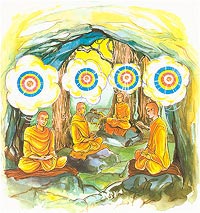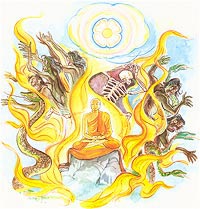

Verse 21. Freedom Is Difficult
Heedfulness is the Deathless path,
heedlessness, the path to death.
Those who are heedful do not die,
heedless are like the dead.
Explanation: The path to the Deathless is the perpetual awareness of experience. The deathless does not imply a physical state where the body does not die. When an individual becomes totally aware of the process of experiencing, he is freed from the continuity of existence. Those who do not have that awareness are like the dead, even if they are physically alive.

Verse 22. Freedom Is Difficul
The wise then, recognizing this
as the distinction of heedfulness,
pleased with the spheres of Nobles Ones,
in heedfulness rejoice.
Explanation: Those who are truly wise are especially aware of the need for sanity. They take delight in sanity. They take pleasure in the pursuit of sanity because it is the region of the supernormal.

Verse 23. Freedom Is Difficult
They meditate persistently,
constantly they firmly strive,
the steadfast to Nibbana reach,
the Unexcelled Secure from bonds.
Explanation: Those wise individuals who steadfastly practice meditation, reach a level of understanding that enables them to experience Nibbana. Those wise individuals who unceasingly continue in their meditation, firmly and steadfastly, experience Nibbana, which is the supreme release from all bonds.

Verse 24. Glory Of The Mindful Increase
Assiduous and mindful,
pure kamma making, considerate,
restrained, by Dhamma heedful living,
for one such spread renown.
Explanation: If a person is persevering, attention focused within, if his physical and spiritual actions are unblemished, if he is restrained and if he is living in accordance with the Teaching and is sane, his glory will grow.

Verse 25. Island Against Floods
By energy and heedfulness,
by taming and by self-control,
the one who’s wise should make as isle
no flood can overwhelm.
Explanation: The whole world is full of defilements. The sensualities of life are a vast and forceful flood. But the wise person builds steadfastly for himself an Island that cannot be washed away by those vast floods. The Island is built of steadfastness, mindfulness, restraint and discipline. Once steadily established on that island, the flood cannot overwhelm the wise.

Verse 26. Treasured Mindfulness
Foolish folk of little wit
in heedlessness indulge,
the one who’s wise guards heedfulness
kin to the greatest wealth.
Explanation:Those who are foolish and indiscriminating indulge in heedlessness. But the wise cherish mindfulness as a great treasure. The foolish people live a life of sensual pleasure. They indulge in pursuits that are not at all conductive to spiritual advancement. To obtain worldly acquisitions, people need wealth. In the same way, to obtain high spiritual acquisitions we need some wealth, and that wealth is mindfulness.

Verse 27. Meditation Leads To Bliss
Don’t indulge in heedlessness!
Don’t come near to sexual joys!
The heedful and contemplative
attains abundant bliss.
Explanation: Do not indulge in heedlessness. Avoid craving for sensual pleasures, whatever their nature. The mindful person is tranquil in mind. He will attain the great bliss.

Verse 28. The Sorrowless View The World
When one who’s wise does drive away
heedlessness by heedfulness,
having ascended wisdom’s tower
steadfast, one surveys the fools,
griefless, views the grieving folk,
as mountaineer does those below.
Explanation: The wise person is always mindful. Through this alertness he discards the ways of the slothful. The wise person ascends the tower of wisdom. Once he has attained that height he is capable of surveying the sorrowing masses with sorrowless eyes. Detached and dispassionate he sees these masses like a person atop a mountain peak, surveying the ground below.

Verse 29. The Mindful One Is Way Ahead Of Others
Among the heedless, heedful,
among the sleepy, wide awake.
As the swift horse outruns a hack
so one of good wisdom wins
Explanation: The extremely wise individual of deep wisdom is always alert and mindful. He is therefore like a wide-awake individual among those who are deep in sleep. That wise person, who possesses supreme insight overtakes in spirituality all those ordinary masses, just as a fast horse overtakes a weak one.

Verse 30. Mindfulness Made Him Chief Of Gods
Heedfulness is always praised,
heedlessness is ever blamed.
By heedfulness did Magha go
to lordship of the gods.
Explanation: The brahmin youth Magha, through his mindfulness, was born as the Chief of Gods. Therefore mindfulness is always praised, and sloth and unmindfulness are always condemned.

Verse 31. The Heedful Advance
The bhikkhu liking heedfulness,
seeing fear in heedlessness,
advances as a conflagration
burning fetters great and small.
Explanation: The monk, as the seeker after the truth, is frightened of mindlessness because he knows that if one is unmindful, one is caught up in the unending suffering of samsara. Therefore, he forges ahead diligently, and mindfully burning away those bonds that fetter people to worldliness

Verse 32. The Heedful Advances To Nibbana
The bhikkhu liking heedfulness,
seeing fear in heedlessness,
never will he fall away,
near is he to Nibbana.
Explanation: The monk as the seeker after the truth, see fear in lack of mindfulness. He will certainly not fall back from any spiritual heights he has already reached. He is invariably in the proximity of Nibbana.

